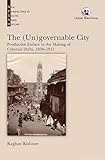The (un)governable city : productive failure in the making of colonial Delhi, 1858-1911. /Raghav Kishore.
Material type: TextPublisher number: : Savera Book Distributors | : 4754 Akarshan Bhawan, 23 Ansari Road, Darya Ganj, New Delhi.Publication details: , Telangana, India : Orient BlackSwan, Hyderabad , 2020Description: xiv, 259 pages : illustrations (black and white) ; 23 cmISBN: 9789390122981Subject(s): City planning | History | City planning India Delhi History | Delhi (India) Colonies Administration HistoryDDC classification: 954.56 KIS Summary: Mirza Ghalib, the poet laureate of Delhi, had lamented the transformation of the city into a cantonment in the aftermath of the Great Rebellion of 1857. No longer the Mughal imperial capital, Delhi was stripped of its political status and incorporated within the province of Punjab as punishment by the colonial rulers. The (Un)governable City, dedicated entirely to Delhi s provincial history under colonial rule, explores this radical transformation of urban governance in Delhi between 1858 and 1911 as bureaucracy expanded and new modes of governance reshaped the city spatially, politically and culturally. Contesting the view that the aftermath of the rebellion was a period of political stability, the author creatively demonstrates how the tensions, contradictions and failures of colonial policies were responsible for the unintended development of state capacity and also provided opportunities for Delhi s residents and social groups to assert their claims to city spaces. This volume brings to scrutiny Delhi s cultural, economic and political transitions, and the relationships between local, regional and imperial governments during this period. The book presents fresh material on Delhi s urban property relations after 1857, the Delhi municipality s policing of public spaces, colonial arboriculture plans to improve suburban lands, processional activities, as well as railway, traffic management and commercial growth initiatives after the 1880s.
TextPublisher number: : Savera Book Distributors | : 4754 Akarshan Bhawan, 23 Ansari Road, Darya Ganj, New Delhi.Publication details: , Telangana, India : Orient BlackSwan, Hyderabad , 2020Description: xiv, 259 pages : illustrations (black and white) ; 23 cmISBN: 9789390122981Subject(s): City planning | History | City planning India Delhi History | Delhi (India) Colonies Administration HistoryDDC classification: 954.56 KIS Summary: Mirza Ghalib, the poet laureate of Delhi, had lamented the transformation of the city into a cantonment in the aftermath of the Great Rebellion of 1857. No longer the Mughal imperial capital, Delhi was stripped of its political status and incorporated within the province of Punjab as punishment by the colonial rulers. The (Un)governable City, dedicated entirely to Delhi s provincial history under colonial rule, explores this radical transformation of urban governance in Delhi between 1858 and 1911 as bureaucracy expanded and new modes of governance reshaped the city spatially, politically and culturally. Contesting the view that the aftermath of the rebellion was a period of political stability, the author creatively demonstrates how the tensions, contradictions and failures of colonial policies were responsible for the unintended development of state capacity and also provided opportunities for Delhi s residents and social groups to assert their claims to city spaces. This volume brings to scrutiny Delhi s cultural, economic and political transitions, and the relationships between local, regional and imperial governments during this period. The book presents fresh material on Delhi s urban property relations after 1857, the Delhi municipality s policing of public spaces, colonial arboriculture plans to improve suburban lands, processional activities, as well as railway, traffic management and commercial growth initiatives after the 1880s.
| Item type | Current library | Call number | Status | Date due | Barcode | Item holds |
|---|---|---|---|---|---|---|
 Books
Books
|
SNU LIBRARY | 954.56 KIS (Browse shelf(Opens below)) | Not For Loan | 29136 |
Browsing SNU LIBRARY shelves Close shelf browser (Hides shelf browser)

|

|

|

|

|

|

|
||
| 954.56 HAS Monuments of Delhi | 954.560 JAC The Delhi Sultanate | 954.560 JAC The Delhi Sultanate | 954.56 KIS The (un)governable city : productive failure in the making of colonial Delhi, 1858-1911. | 954.56 KUM The emergence of the Delhi Sultanate, 1192-1286 | 954.56 KUM The emergence of the Delhi Sultanate, 1192-1286 | 954.56 KUM The emergence of the Delhi Sultanate, 1192-1286 |
Mirza Ghalib, the poet laureate of Delhi, had lamented the transformation of the city into a cantonment in the aftermath of the Great Rebellion of 1857. No longer the Mughal imperial capital, Delhi was stripped of its political status and incorporated within the province of Punjab as punishment by the colonial rulers. The (Un)governable City, dedicated entirely to Delhi s provincial history under colonial rule, explores this radical transformation of urban governance in Delhi between 1858 and 1911 as bureaucracy expanded and new modes of governance reshaped the city spatially, politically and culturally. Contesting the view that the aftermath of the rebellion was a period of political stability, the author creatively demonstrates how the tensions, contradictions and failures of colonial policies were responsible for the unintended development of state capacity and also provided opportunities for Delhi s residents and social groups to assert their claims to city spaces. This volume brings to scrutiny Delhi s cultural, economic and political transitions, and the relationships between local, regional and imperial governments during this period. The book presents fresh material on Delhi s urban property relations after 1857, the Delhi municipality s policing of public spaces, colonial arboriculture plans to improve suburban lands, processional activities, as well as railway, traffic management and commercial growth initiatives after the 1880s.


There are no comments on this title.